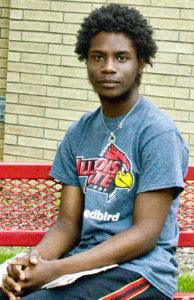
Most of America and the world are appalled by the murder of George Floyd who died with his neck under the knee of a white Minneapolis police officer while other police officers passively looked on.
If you don’t see this as an overt example of racially motivated murder, your eyes are closed to the truth. Some right-leaning commentators contend Floyd had a criminal record. That’s little more than a diversion from the reality of how he died. These right-leaning commentators also neglect to point out the police officer who killed Floyd had a long history of complaints for excessive use of force.

Sincere Williams
A Richwoods High School graduate, Williams is a rising voice in the Black justice movement in Peoria. He was president of the Minority Academic Advancement Project in high school. He’s president of the Black Justice Project and president of Young Revolution. He’s on his way to Morehouse College with his sights on a degree in political science and then Georgetown University and a law degree focusing on civil rights and racism in the law.
Racism is the foundational issue that supports injustice. Racism is not a finite problem to be solved but an evolving virus that needs evolving solutions and new laws.
Williams would like to see some redress through legislation, such as a law that any police officer who turns off his body camera faces termination.
“I don’t believe racism will end soon. I feel there will always be people who choose to hate,” he said. “We can throw all the facts and statistics out there, but if you choose to have hate in your heart, you will.”
Williams is a human rights advocate and says his beliefs stem from his own struggles as a young Black gay man.
“My strength comes from my mother. My hardships were our hardships. If I was ever tempted to give up, she gave me strength. My mom always had my back,” he said.
Even though he learned to deal with the bullying and eventually to ignore it, he saw others suffering and crumbling under emotional assaults. That’s when he became a human rights advocate.
“When I was no longer trapped in self-doubt, I was able to open my eyes and see what others were going through,” he said. “If you still deny racism and oppression exist, open your eyes. Right now America is in one of the biggest Black movements in history.”
Williams said the Civil Rights movement of the 1960s resolved many technical legal issues of discrimination but did not resolve the ethical immorality of discrimination.
“People on the side of justice outnumber people on the other side,” he said.
Williams said in order to achieve political and legislative remedies, people must vote. He’d like to run a political campaign.
“I’m good with organization,” he said.
His message to political candidates:
“I’d like a president to listen more. Listen and fight for justice in America. Don’t capitalize on what you did in the past, but tell us how you are going to keep fighting discrimination in the future. And then make good on what you promise. Change America so we don’t have to keep chanting ‘Black Lives Matter.'”
Now think again about George Floyd and try what John Grisham proposed in his first novel “A Time to Kill.” Close your eyes and re-imagine the situation: Floyd is a white man and the four officers are Black and they watch as one of their colleagues kills Floyd as he is handcuffed face down on the street for allegedly using a fake $20 bill.

1 comment for “Editorial | Sincere Williams: A rising voice in Peoria’s justice community”